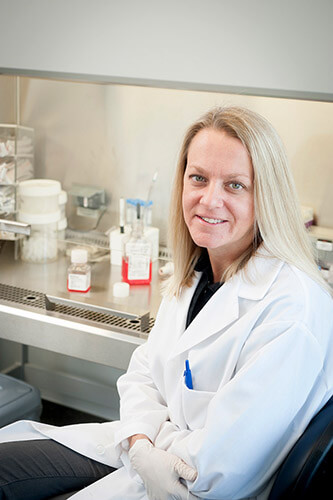May 23, 2017
Science on Tap to probe into the 'dark matter' of the human genome
 Andrea Kasinski
Andrea Kasinski
Download image
WEST LAFAYETTE, Ind. - Purdue University biological sciences professor Andrea Kasinski will highlight research efforts delving into how cells function and are surprising scientists even today during this week's Science on Tap.
Kasinski will give a talk titled, "Exploring the Essential Dark Matter of the Genome," at 6 p.m. Thursday (May 25) on the top floor of Lafayette Brewing Company, 622 Main St., Lafayette. The informal lecture, sponsored by the Department of Biological Sciences and the College of Science, is free and open to those 21 and older.
"If you were heading to the Caribbean, would you take your snow skis? Would you bring your winter jacket? Unlikely. Neither space (in your suitcase), energy to pack and carry these items, nor general logic supports bringing such useless items to a warm climate," Kasinski said. "Why, then, would a cell, which has had billions of years to evolve and figure out precisely what it needs and what it does not need, express, package and store RNA that is not essential? In short, it would not."
For decades, scientists were convinced that the majority of the DNA in the human genome was "junk," Kasinski said, and that only 2 percent or less of the genome was transcribed into RNA, converted into protein and functionally important. Researchers have now verified that over 80-90 percent of the DNA in the human genome is actively transcribed into RNA.
While the vast majority of these RNAs do not encode proteins, they appear to have functions that are essential to normal cellular physiology. Those functions, Kasinski said, for some reason have been overlooked until recently. Researching this so-called "Dark Matter" of the genome has revealed novel classes of non-coding RNAs that are directly contributing to human diseases, such as cancer.
"We have begun to explore the essential functions of these RNAs that are expressed, packaged and stored by the cell, and are harnessing this novel information to design, develop and deliver RNA-based therapeutics for cancer and other human diseases," Kasinski said.
Kasinski, who received her doctorate in biology from Emory University in 2009, focuses the work in her Purdue laboratory on non-coding RNA biology and therapeutics - specifically, on identifying biologically important RNAs whose mis-expression drives the tumorigenic process. Her team then utilizes this information to design, develop and implement RNA-based therapeutics.
Specifically, evidence-based approaches are being developed to identify microRNAs that drive the process of tumorigenesis, or to identify microRNAs that are required for tumor cell maintenance or therapeutic resistance. Using this data, we then develop various strategies to alter the concentration of theses microRNAs in vivo using either small molecule inhibitors, or novel targeting approaches that deliver microRNAs in the absence of toxic delivery vehicles. Our overarching goal is to generate substantial knowledge that will lead to the clinical utility of non-coding RNAs.
Science on Tap, now led by graduate students Andrew Hesselbrock, Paula Cooper, Elizabeth Phillips and Carolina Vivas Valencia, provides Purdue faculty and collaborating researchers the opportunity to share research activities in an informal setting with presentations designed to appeal to a more general audience. Attendance at the event has averaged 80 during the program's first five years.
Writer: Phillip Fiorini. 765-496-3133, pfiorini@purdue.edu
Sources: Andrea Kasinski, 765-496-1658, akasinski@purdue.edu
Carolina Vivas Valencia, cvivas@purdue.edu
Paula Cooper, porourk@purdue.edu
Elizabeth Phillips, phill193@purdue.edu

